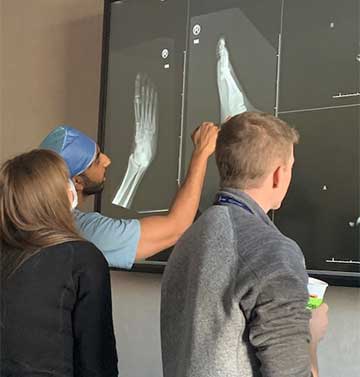Information for Radiology Applicants
Welcome HF Radiology Applicants!
 The department utilizes state of the art technology, with numerous multi-slice CT scanners including CT fluoroscopy for procedures, numerous 3T and 1.5T MRI machines, and a multiplanar fluoroscopy suite capable of producing high resolution 3D angiography for tumor embolization and other endovascular procedures. Digital breast tomosynthesis, in conjunction with contrast enhanced mammography and breast MRI, offers high quality, comprehensive breast cancer screening.
The department utilizes state of the art technology, with numerous multi-slice CT scanners including CT fluoroscopy for procedures, numerous 3T and 1.5T MRI machines, and a multiplanar fluoroscopy suite capable of producing high resolution 3D angiography for tumor embolization and other endovascular procedures. Digital breast tomosynthesis, in conjunction with contrast enhanced mammography and breast MRI, offers high quality, comprehensive breast cancer screening.
Interventional experience is introduced early in the body division with CT and ultrasound guided procedures, followed by advanced musculoskeletal, neuroradiology, vascular, and breast interventions utilizing CT, fluoroscopy, ultrasound, MRI, and MR-ultrasound fusion guidance technologies.
Our subspecialty staff are nearly all fellowship trained and teach extensively at the workstation and during our regular conferences. We also have exceptional physics training, as Henry Ford houses one of the few medical imaging physics residencies in the country. Our graduates have a 100% board pass rate for the ABR Core Examination since its inception.
Our residents send preliminary reads independent of staff on call and overnight, and our 24 hour off-site staff sign the final reports within the hour.
Please explore our website to familiarize yourself with our program. If you have any questions, please don't hesitate to contact our residency program coordinators, Alice Brown and Natalie Garza.
We appreciate your interest in our program and look forward to hearing from you.
Exceptional Training Opportunities at HFH
Thanks to the Edith and Benson Ford Heart & Vascular Institute, our cardiac imaging rotation involves interpretation of multiple daily cardiac MRI and CT studies with great vascular experience. Images are read and interpreted side-by-side with interdisciplinary teaching by both Radiology and Cardiology staff. Similarly, cardiac imaging in nuclear medicine is collaboratively reported with the cardiology department with regular, daily teaching. Our radiology department remains responsible for cardiac CT and MRI dictations, and we have excellent interdepartmental teaching and referral relationships with our cardiology colleagues.
Our Simulation Center offers hands on training with procedures and ultrasound to supplement patient experience, and is available to all residents. Hands on training includes interventional procedures, ultrasound procedures, and core training such as contrast reactions and in-service events.
The Hermelin Brain Tumor Center is another excellent source of high quality, rare pathology not seen by most regional centers. We have both standard of care and cutting edge research-based treatment protocols with frequent imaging follow-up for brain tumors of all types, as well as many head, neck, and spine tumors. This provides an excellent comprehensive neuro-oncologic imaging experience.
Henry Ford Cancer is also an industry leader in oncologic management, and we receive frequent imaging requests for common cancers, as well as rare oncologic and hematologic pathologies.
Lastly Henry Ford Transplant Institute is a large transplant referral center, performing a large number of kidney, liver, pancreas, bowel, and multivisceral transplantations annually. These cases require frequent follow-up imaging with normal appearances and common complications of these transplants imaged and interpreted on a routine basis by our residents.
As a resident, you will have ample opportunity for procedural experience. At HFH, we perform over 17,000 procedures annually, or roughly 1400 monthly. Our West Bloomfield Hospital Campus performs over 4500 procedures annually.
IR-Integrated (IR/DR or Interventional and Diagnostic Pathway)
We have an ACGME accredited program and interview for one integrated IR/DR position annually.
For more information, click here.
Relevant links:
ESIR (Early Specialization in Interventional Radiology)

We also have an ACGME approved ESIR pathway. Completion of an ESIR track allows entry into the 2nd year of an independent interventional radiology residency, decreasing the total training time from seven years to six years. We have 2 ESIR positions available each year.
ESIR training is completed during a diagnostic radiology residency. It requires at least eight interventional radiology rotations, one ICU rotation, and up to three interventional radiology-related rotations during the R1(PGY-2) - R4(PGY-5) years. It also requires at least 500 interventional radiology procedures.
Relevant links:
Additional Henry Ford Health Policies
Flu Shots: Henry Ford employees who work in clinical and non-clinical positions are required to receive an annual flu vaccination. This applies to all residents and fellows, as well as physicians, nurses, students, transporters, volunteers, housekeepers, clerical, lab and dietary staff and employees in non-clinical positions. Employees may only decline vaccination if they provide documentation of an acceptable medical or religious reason.
.svg?iar=0&hash=F6049510E33E4E6D8196C26CCC0A64A4)
/hfh-logo-main--white.svg?iar=0&hash=ED491CBFADFB7670FAE94559C98D7798)